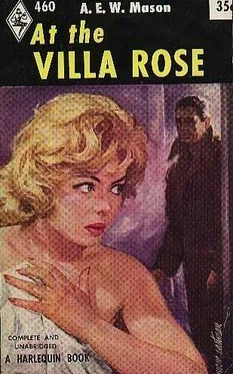A Mason - At the Villa Rose
Здесь есть возможность читать онлайн «A Mason - At the Villa Rose» весь текст электронной книги совершенно бесплатно (целиком полную версию без сокращений). В некоторых случаях можно слушать аудио, скачать через торрент в формате fb2 и присутствует краткое содержание. Год выпуска: 1910, Жанр: Классический детектив, на английском языке. Описание произведения, (предисловие) а так же отзывы посетителей доступны на портале библиотеки ЛибКат.
- Название:At the Villa Rose
- Автор:
- Жанр:
- Год:1910
- ISBN:нет данных
- Рейтинг книги:5 / 5. Голосов: 1
-
Избранное:Добавить в избранное
- Отзывы:
-
Ваша оценка:
- 100
- 1
- 2
- 3
- 4
- 5
At the Villa Rose: краткое содержание, описание и аннотация
Предлагаем к чтению аннотацию, описание, краткое содержание или предисловие (зависит от того, что написал сам автор книги «At the Villa Rose»). Если вы не нашли необходимую информацию о книге — напишите в комментариях, мы постараемся отыскать её.
At the Villa Rose — читать онлайн бесплатно полную книгу (весь текст) целиком
Ниже представлен текст книги, разбитый по страницам. Система сохранения места последней прочитанной страницы, позволяет с удобством читать онлайн бесплатно книгу «At the Villa Rose», без необходимости каждый раз заново искать на чём Вы остановились. Поставьте закладку, и сможете в любой момент перейти на страницу, на которой закончили чтение.
Интервал:
Закладка:
"But if you offered him your help it would be welcomed," cried Wethermill. "And to me that would mean so much. There would be no bungling. There would be no waste of time. Of that one would be sure."
Hanaud shook his head gently. His eyes were softened now by a look of pity. Suddenly he stretched out a forefinger.
"You have, perhaps, a photograph of the young lady in that card-case in your breast-pocket."
Wethermill flushed red, and, drawing out the card-case, handed the portrait to Hanaud. Hanaud looked at it carefully for a few moments.
"It was taken lately, here?" he asked.
"Yes; for me," replied Wethermill quietly.
"And it is a good likeness?"
"Very."
"How long have you known this Mlle. Celie?" he asked.
Wethermill looked at Hanaud with a certain defiance.
"For a fortnight."
Hanaud raised his eyebrows.
"You met her here?"
"Yes."
"In the rooms, I suppose? Not at the house of one of your friends?"
"That is so," said Wethermill quietly. "A friend of mine who had met her in Paris introduced me to her at my request."
Hanaud handed back the portrait and drew forward his chair nearer to Wethermill. His face had grown friendly. He spoke with a tone of respect.
"Monsieur, I know something of you. Our friend, Mr. Ricardo, told me your history; I asked him for it when I saw you at his dinner. You are of those about whom one does ask questions, and I know that you are not a romantic boy, but who shall say that he is safe from the appeal of beauty? I have seen women, monsieur, for whose purity of soul I would myself have stood security, condemned for complicity in brutal crimes on evidence that could not be gainsaid; and I have known them turn foul-mouthed, and hideous to look upon, the moment after their just sentence has been pronounced."
"No doubt, monsieur," said Wethermill, with perfect quietude. "But Celia Harland is not one of those women."
"I do not now say that she is," said Hanaud. "But the Juge d’lnstruction here has already sent to me to ask for my assistance, and I refused. I replied that I was just a good bourgeois enjoying his holiday. Still it is difficult quite to forget one’s profession. It was the Commissaire of Police who came to me, and naturally I talked with him for a little while. The case is dark, monsieur, I warn you."
"How dark?" asked Harry Wethermill.
"I will tell you," said Hanaud, drawing his chair still closer to the young man. "Understand this in the first place. There was an accomplice within the villa. Some one let the murderers in. There is no sign of an entrance being forced; no lock was picked, there is no mark of a thumb on any panel, no sign of a bolt being forced. There was an accomplice within the house. We start from that."
Wethermill nodded his head sullenly. Ricardo drew his chair up towards the others. But Hanaud was not at that moment interested in Ricardo.
"Well, then, let us see who there are in Mme. Dauvray’s household. The list is not a long one. It was Mme. Dauvray’s habit to take her luncheon and her dinner at the restaurants, and her maid was all that she required to get ready her 'petit dejeuner' in the morning and her 'sirop' at night. Let us take the members of the household one by one. There is first the chauffeur, Henri Servettaz. He was not at the villa last night. He came back to it early this morning."
"Ah!" said Ricardo, in a significant exclamation. Wethermill did not stir. He sat still as a stone, with a face deadly white and eyes burning upon Hanaud’s face.
"But wait," said Hanaud, holding up a warning hand to Ricardo. "Servettaz was in Chambery, where his parents live. He travelled to Chambery by the two o’clock train yesterday. He was with them in the afternoon. He went with them to a cafe in the evening. Moreover, early this morning the maid, Helene Vauquier, was able to speak a few words in answer to a question. She said Servettaz was in Chambery. She gave his address. A telephone message was sent to the police in that town, and Servettaz was found in bed. I do not say that it is impossible that Servettaz was concerned in the crime. That we shall see. But it is quite clear, I think, that it was not he who opened the house to the murderers, for he was at Chambery in the evening, and the murder was already discovered here by midnight. Moreover-it is a small point-he lives, not in the house, but over the garage in a corner of the garden. Then besides the chauffeur there was a charwoman, a woman of Aix, who came each morning at seven and left in the evening at seven or eight. Sometimes she would stay later if the maid was alone in the house, for the maid is nervous. But she left last night before nine-there is evidence of that-and the murder did not take place until afterwards. That is also a fact, not a conjecture. We can leave the charwoman, who for the rest has the best of characters, out of our calculations. There remain then, the maid, Helene Vauquier, and"-he shrugged his shoulders-"Mlle. Celie."
Hanaud reached out for the matches and lit a cigarette.
"Let us take first the maid, Helene Vauquier. Forty years old, a Normandy peasant woman-they are not bad people, the Normandy peasants, monsieur-avaricious, no doubt, but on the whole honest and most respectable. We know something of Helene Vauquier, monsieur. See!" and he took up a sheet of paper from the table. The paper was folded lengthwise, written upon only on the inside. "I have some details here. Our police system is, I think, a little more complete than yours in England. Helene Vauquier has served Mme. Dauvray for seven years. She has been the confidential friend rather than the maid. And mark this, M. Wethermill! During those seven years how many opportunities has she had of conniving at last night’s crime? She was found chloroformed and bound. There is no doubt that she was chloroformed. Upon that point Dr. Peytin is quite, quite certain. He saw her before she recovered consciousness. She was violently sick on awakening. She sank again into unconsciousness. She is only now in a natural sleep. Besides those people, there is Mlle. Celie. Of her, monsieur, nothing is known. You yourself know nothing of her. She comes suddenly to Aix as the companion of Mme. Dauvray-a young and pretty English girl. How did she become the companion of Mme. Dauvray?"
Wethermill stirred uneasily in his seat. His face flushed. To Mr. Ricardo that had been from the beginning the most interesting problem of the case. Was he to have the answer now?
"I do not know," answered Wethermill, with some hesitation, and then it seemed that he was at once ashamed of his hesitation. His accent gathered strength, and in a low but ringing voice, he added: "But I say this. You have told me, M. Hanaud, of women who looked innocent and were guilty. But you know also of women and girls who can live untainted and unspoilt amidst surroundings which are suspicious."
Hanaud listened, but he neither agreed nor denied. He took up a second slip of paper.
"I shall tell you something now of Mme. Dauvray," he said. "We will not take up her early history. It might not be edifying and, poor woman, she is dead. Let us not go back beyond her marriage seventeen years ago to a wealthy manufacturer of Nancy, whom she had met in Paris. Seven years ago M. Dauvray died, leaving his widow a very rich woman. She had a passion for jewellery, which she was now able to gratify. She collected jewels. A famous necklace, a well-known stone-she was not, as you say, happy till she got it. She had a fortune in precious stones-oh, but a large fortune! By the ostentation of her jewels she paraded her wealth here, at Monte Carlo, in Paris. Besides that, she was kind-hearted and most impressionable. Finally, she was, like so many of her class, superstitious to the degree of folly."
Suddenly Mr. Ricardo started in his chair. Superstitious! The word was a sudden light upon his darkness. Now he knew what had perplexed him during the last two days. Clearly-too clearly-he remembered where he had seen Celia Harland, and when. A picture rose before his eyes, and it seemed to strengthen like a film in a developing-dish as Hanaud continued:
Читать дальшеИнтервал:
Закладка:
Похожие книги на «At the Villa Rose»
Представляем Вашему вниманию похожие книги на «At the Villa Rose» списком для выбора. Мы отобрали схожую по названию и смыслу литературу в надежде предоставить читателям больше вариантов отыскать новые, интересные, ещё непрочитанные произведения.
Обсуждение, отзывы о книге «At the Villa Rose» и просто собственные мнения читателей. Оставьте ваши комментарии, напишите, что Вы думаете о произведении, его смысле или главных героях. Укажите что конкретно понравилось, а что нет, и почему Вы так считаете.












